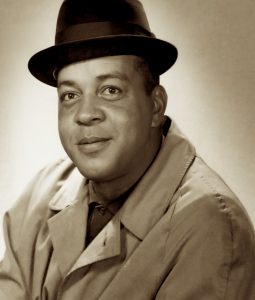(Apr. 10, 1928-Sept. 8, 2007). Born in Indianapolis, Russell Webster was the last of 12 children born to William and Clotelle Webster. As a church organist at an eastside Baptist church, Webster’s mother insisted all her children learn to play the piano as well as a second instrument. Under the tutelage of Russell Brown and LaVerne Newsome, Webster started his classical training in woodwinds at alongside lifelong friend .
Webster and Johnson would sneak into the jazz clubs along to hear local musicians and LeRoy Vinegar, and legends Duke Ellington and Cab Calloway perform. At school, the two high schoolers would slip out of band class into the music practice rooms to experiment with the sounds they had heard in the clubs.
Webster continued his classical training with Charles Henzie at the Arthur Jordan Conservatory of Music at . Though he demonstrated exceptional skill playing the baritone, Henzie encouraged him to master as many woodwinds as possible. He earned a spot in a coveted exchange program with other conservatory students who performed with the under directorship and spent a summer studying classical musicianship at the prestigious Julliard Conservatory in New York City.
Around 1950, Webster served in the 384th Regiment Army Band. Here, he performed saxophone at USO performances alongside nationally known stars such as Jackie Gleason. He also sang at a jazz exposition in the royal palace of the Crown Prince of Siam (now Thailand).
When Webster returned to Indianapolis in 1952, he found work with the U.S. Postal Service. People dubbed Webster the “Whistling Postman” for his habit of whistling originally composed tunes while delivering the mail. During the evenings and on weekends, Webster performed his original music in the dinner clubs and speakeasies on Indiana Avenue alongside musicians such as , , , and .
During the next few decades, Webster stayed busy with recordings and stage work. He sang in the production of Showboat and performed in various productions at and Civic Theatre. Still remembered as the music-loving postman, the created a Whistling Postman puppet during an episode of its popular children’s program Time for Timothy in 1970.
In 1983, Webster became one of the first jazz musicians in Indianapolis to delve into funk music. He coordinated a project with the UK’s Jazzman recording label to produce “Uncle Funkenstein—Together Again.” Webster recruited best friend Pookie Johnson on saxophone, along with five other Indianapolis musicians for the recording. Jazzman released 1,000 copies of the vinyl record, which many collectors consider a classic.
Webster continued to perform jazz music and experiment with different genres during the 1990s. With his Russell Webster Quartet, he performed at local jazz clubs and at summer festivals. As members of the Jimmy Coe Big Band, the ensemble demonstrated the adaptability of the big band format with swing-era classics, modern tunes, and boogie-woogie songs.
Over his career, Webster demonstrated a musical expertise that spanned many genres including classical, jazz, bebop, and funk. Mayor honored Webster’s impact on music in general by proclaiming a “Russell Webster Day” in 1990. The recognized Webster’s contributions to the jazz genre by inducting him into its Hall of Fame in 1998.

Help improve this entry
Contribute information, offer corrections, suggest images.
You can also recommend new entries related to this topic.





